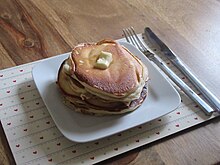Crempog
 Crempogau, made using the Anglesey recipe | |
| Alternative names | Ffroes |
|---|---|
| Type | Pancake |
| Place of origin | Wales, United Kingdom |
| Main ingredients | batter |
The crempog (plural: crempogau) is a
Name
The word "crempog" has its origins in the Welsh language, but is similar to the Breton word krampouezh, which is also a type of pancake.[1][2] Comparisons are often drawn between the two Celtic languages which share ancestry in the Brittonic language, though the krampouezh is more dainty than the crempog and is today closer to a crêpe than a pancake.[3][4]
The English word
History
| Part of a series on the |
| Culture of Wales |
|---|
 |
| People |
|
Art |

The history of food in Wales is poorly documented, and much of what is known lies in verbal and archaeological evidence. Wales has a long history of baking using a
Although there is no documented evidence of the earliest crempog recipe, the basic ingredients, readily available in Wales suggests a long history. The recipe for crempog reflects very old cookery traditions that were once common throughout Britain.[9] Bobby Freeman, writing in 1980, states that crempog, along with cawl, is the one Welsh ingredient to have endured from past times.[9] Despite crempog being a staple of Welsh cuisine due to its ease of preparation in past times, it is also connected to traditional celebrations.[9] Crempog was served on Shrove Tuesday throughout Wales and was associated with birthdays, especially in south Wales, where the stack of pancakes are cut down in wedges and served like a cake.[9][10]
Preparation
For the standard crempog recipe, butter is melted in warm
The thick batter is poured onto a hot bakestone or griddle, over a moderate heat. The crempog is cooked until golden on both sides and served in a stack with butter spread on each pancake.[9]
Variants
In
Although crempog is the term most commonly associated with Welsh pancakes they were known by different names around the country. Crempog was the term most often used in north Wales, while in parts of
As with most meals there are no specific recipe for crempog.
In poetry
A Welsh verse[14] sung by children refers to crempogau:
- Modryb Elin Enog
- Os gwelwch chi'n dda ga i grempog?
- Cew chithau de a siwgr brown
- A phwdin lond eich ffedog
- Modryb Elin Enog
- Mae 'ngheg i'n grimp am grempog
- Mae Mam rhy dlawd i brynu blawd
- A Sian yn rhy ddiog i nol y triog
- A 'nhad yn rhy wael i weithio
- Os gwelwch chi'n dda ga i grempog
In English:
- Auntie Elin Enog
- Please may I have a pancake?
- You can have tea and brown sugar
- And your apron full of pudding
- Auntie Elin Enog
- My mouth is parched for pancakes
- My mum is too poor to buy flour
- And Sian is too lazy to get the treacle
- And my father's too sick to work
- Please may I have a pancake?
See also
- Crumpet
- List of pancakes
- List of English words of Celtic origin
 food portal
food portal
References
- ^ ISBN 9781445648750.
- ^ "Comments and Criticisms by Cochfarf". Evening Express. 4 March 1901. Retrieved 3 April 2016.
- ^ Davies et al. 2008, p. 915.
- ^ Freeman 1980, pp. 15–16.
- ^ "Celtic Lexicon: Cornish". University of York. Retrieved 2 April 2016.
- ^ Tibbott 2002, p. 80-81.
- ^ a b c Tibbott 2002, p. 81.
- ^ a b c d Tibbott 2002, p. 86.
- ^ a b c d e f g Freeman 1980, p. 153.
- ^ Tibbott 2002, p. 86-87.
- ^ Freeman 1980, p. 156.
- ^ a b Tibbott 2002, p. 87.
- ^ a b c Freeman 1980, p. 154.
- ^ King Arthur's Tea Recipes
- Bibliography
- ISBN 978-0-7083-1953-6.
- Freeman, Bobby (1980). First Catch Your Peacock, a Book of Welsh Food. Griffithstown, Gwent: Image Imprint. ISBN 0-9507254-1-2.
- Tibbott, S. Minwel (2002). Domestic Life in Wales. Cardiff: University of Wales Press. ISBN 0-7083-1746-4.
External links
- Crempog recipe at www.everything2.com
- Crempogs Ynys Mon recipe
